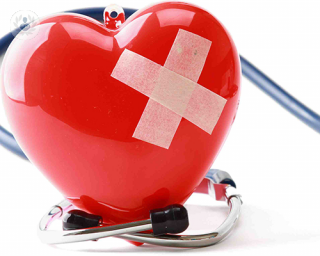Cardiac medication
Mr George Asimakopoulos - Cardiothoracic surgery
Created on: 05-20-2020
Updated on: 09-18-2023
Edited by: Kate Forristal
What are cardiac medications?
Cardiac medications help keep your heart condition under control by either treating it or preventing your symptoms from worsening. There are many types and they all work differently; some can help lower your blood pressure and reduce cholesterol levels, whilst others help your body get rid of certain fluids that are preventing your heart from pumping blood correctly.

As there are various forms - such as tablets, capsules or self-adhesive patches - you should see a cardiologist and they will advise you on which ones are safe for you to use and how to take them.
What are some common types?
There are lots of different medicines available to treat diseases of the heart. The most common are:
- ACE inhibitors, such as ramipril
- ARNI (angiotensin receptor-neprilysin inhibitor)
- Angiotensin-II antagonists (ARBs)
- Antiarrhythmic medicines
- Anticoagulant medicines
- Beta-blockers, such as bisoprolol
- Calcium channel blockers
- Cholesterol-lowering medicines, such as simvastatin
- Digoxin Diuretics, such as bendroflumethiazide
- Nitrates, such as glyceryl trinitrate tablets
It’s possible that you may need to take more than just one of these medicines every day.
Which conditions are cardiac medicines used for?
You would take cardiac medications if you have been diagnosed with a heart problem or your doctor believes you are at a high risk of developing one of the following conditions:
- Angina
- Heart attack
- Heart failure
- Hypertension (high blood pressure)
- Arrhythmia
- Valvular heart disease
- High blood cholesterol levels
How are these medications taken?
As there are so many, each one comes in a different form and needs to be taken in a certain way. The most common way of taking cardiac medication is by:
- Mouth — in tablet or capsule form, you should swallow it with water. Some types require it to be dissolved before digesting it, whilst others should be kept under the tongue until it has been dissolved and absorbed into the body.
- Aerosol spray — you can spray these under your tongue and the medicine is absorbed into the body.
- Self-adhesive patch — the medicine you need is inside the patch. After applying it to the skin, it is then absorbed into the body throughout the day.
- Into a vein, muscle or under the skin— the medicine can be injected directly into your vein, just under the skin or into a muscle like the buttock or thigh.
When you are prescribed medication, your doctor or pharmacist will instruct you on how to take it properly. You can also refer to the information leaflet that comes with the medication where the daily dosage will be detailed.
When do I need to take my medication?
Your doctor will always tell you how much and how often you should take your medication. In conditions such as angina, you might be asked to only take it when you are having symptoms, whilst in cases such as high blood pressure, you may have to take them every day.
It’s easy to forget to take your medication and it’s also easy to forget if you have already taken it, especially when you become so used to doing it every day. Therefore, you should stick to a schedule to help you. You can even buy a pillbox with the days of the week marked on it to make it easier for you to remember which ones you have taken.
If your doctor changes your dosage, you can create a medicine calendar to note down the dosage changes to help you keep track.
You should never adjust the times or dosage of your medication without the advice of your doctor. It can make your condition worse if you do this. If you forget to take a tablet one day, you should let your doctor know.
Are there side-effects to these medicines?
Not everyone will experience side-effects but some people do. Usually, the side-effects are short-lived and disappear rather quickly though. Each medication has its own side-effects, so read the information leaflet that comes with the medicine or talk to your doctor.
If you experience uncomfortable side-effects, don’t stop taking your medication. You must be taking it correctly, so you should talk to your doctor as soon as possible so they can give you further advice. They may reduce the dose or switch you to a different type.
Some over-the-counter medicines can react badly with cardiac medicines, so always inform the pharmacist what medication you are on before taking anything else.


